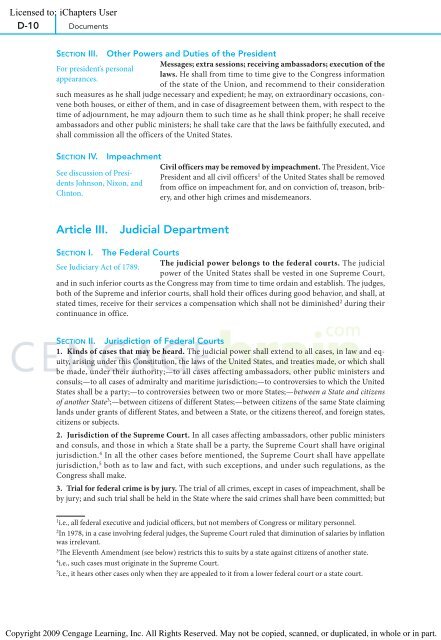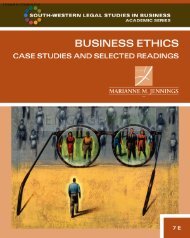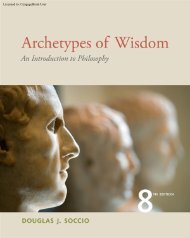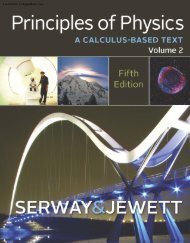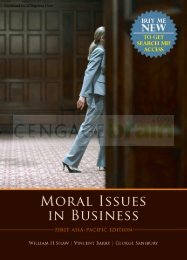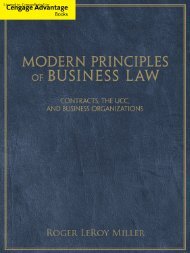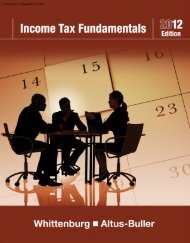03469_00_FM_pi-xxxii pp2.indd - CengageBrain
03469_00_FM_pi-xxxii pp2.indd - CengageBrain
03469_00_FM_pi-xxxii pp2.indd - CengageBrain
You also want an ePaper? Increase the reach of your titles
YUMPU automatically turns print PDFs into web optimized ePapers that Google loves.
Licensed to:<br />
D-10 Documents<br />
SECTION III. Other Powers and Duties of the President<br />
For president’s personal<br />
appearances.<br />
Messages; extra sessions; receiving ambassadors; execution of the<br />
laws. He shall from time to time give to the Congress information<br />
of the state of the Union, and recommend to their consideration<br />
such measures as he shall judge necessary and expedient; he may, on extraordinary occasions, convene<br />
both houses, or either of them, and in case of disagreement between them, with respect to the<br />
time of adjournment, he may adjourn them to such time as he shall think proper; he shall receive<br />
ambassadors and other public ministers; he shall take care that the laws be faithfully executed, and<br />
shall commission all the officers of the United States.<br />
SECTION IV. Impeachment<br />
See discussion of Presidents<br />
Johnson, Nixon, and<br />
Clinton.<br />
Article III. Judicial Department<br />
Civil officers may be removed by impeachment. The President, Vice<br />
President and all civil officers 1 of the United States shall be removed<br />
from office on impeachment for, and on conviction of, treason, bribery,<br />
and other high crimes and misdemeanors.<br />
SECTION I. The Federal Courts<br />
The judicial power belongs to the federal courts. The judicial<br />
power of the United States shall be vested in one Supreme Court,<br />
and in such inferior courts as the Congress may from time to time ordain and establish. The judges,<br />
both of the Supreme and inferior courts, shall hold their offices during good behavior, and shall, at<br />
stated times, receive for their services a compensation which shall not be diminished2 See Judiciary Act of 1789.<br />
during their<br />
continuance in office.<br />
SECTION II. Jurisdiction of Federal Courts<br />
1. Kinds of cases that may be heard. The judicial power shall extend to all cases, in law and equity,<br />
arising under this Constitution, the laws of the United States, and treaties made, or which shall<br />
be made, under their authority;—to all cases affecting ambassadors, other public ministers and<br />
consuls;—to all cases of admiralty and maritime jurisdiction;—to controversies to which the United<br />
States shall be a party;—to controversies between two or more States;—between a State and citizens<br />
of another State3 ;—between citizens of different States;—between citizens of the same State claiming<br />
lands under grants of different States, and between a State, or the citizens thereof, and foreign states,<br />
citizens or subjects.<br />
2. Jurisdiction of the Supreme Court. In all cases affecting ambassadors, other public ministers<br />
and consuls, and those in which a State shall be a party, the Supreme Court shall have original<br />
jurisdiction. 4 In all the other cases before mentioned, the Supreme Court shall have appellate<br />
jurisdiction, 5 both as to law and fact, with such exceptions, and under such regulations, as the<br />
Congress shall make.<br />
3. Trial for federal crime is by jury. The trial of all crimes, except in cases of impeachment, shall be<br />
by jury; and such trial shall be held in the State where the said crimes shall have been committed; but<br />
1i.e., all federal executive and judicial offi cers, but not members of Congress or military personnel.<br />
2In 1978, in a case involving federal judges, the Supreme Court ruled that diminution of salaries by infl ation<br />
was irrelevant.<br />
3Th e Eleventh Amendment (see below) restricts this to suits by a state against citizens of another state.<br />
4i.e., such cases must originate in the Supreme Court.<br />
5i.e., it hears other cases only when they are appealed to it from a lower federal court or a state court.<br />
Copyright 2<strong>00</strong>9 Cengage Learning, Inc. All Rights Reserved. May not be co<strong>pi</strong>ed, scanned, or duplicated, in whole or in part.


